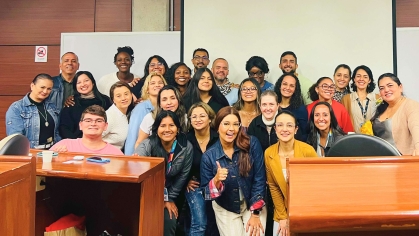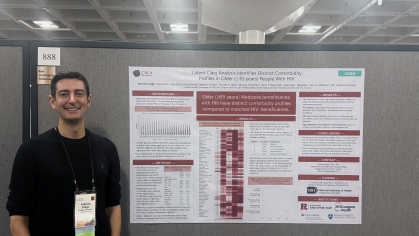Doctoral Student Receives National Recognition for Advancing Environmental Health Research

Meet Lila Bazina, a Rutgers School of Public Health PhD student!
Lila Bazina, a Doctor of Philosophy (PhD) student in Environmental and Occupational Health at the Rutgers School of Public Health, attended and presented at the Society of Toxicology (SOT) Annual Meeting and ToxExpo earlier this year. Bazina was awarded the 2025 Research & Conference Travel Award from the Rutgers School of Graduate Studies to attend.
At the conference, she was also recognized with the Nanoscience and Advanced Materials Specialty Section’s Outstanding Graduate Student Award and the Arab Toxicologists Association’s Best Abstract Award.
As a doctoral student and dedicated researcher, Bazina’s work combines nanotoxicology, molecular biology, and environmental health to address some of today’s most urgent public health challenges.
We sat down with Bazina to learn more about her experiences at the conference and as a doctoral student, and her research focus.
---
Could you share your background and why you pursued a doctoral degree at the Rutgers School of Public Health?
I am a dedicated researcher passionate about nanotoxicology, molecular biology, and environmental health. Currently, I am pursuing a PhD at the Rutgers School of Public Health, focusing on the toxicological implications of environmentally relevant nanoparticles.
When I'm not in the lab, I'm playing tennis or discovering a new cafe with friends, which helps me maintain a great work-life balance.
I chose to pursue my doctoral degree at the Rutgers School of Public Health due to both the opportunity to continue working with my current PI, Professor Philip Demokritou, who was also my mentor during my master’s degree at Harvard University, and the strength of Rutgers' program.
When Dr. Demokritou transitioned to Rutgers, I was eager to follow and continue our research, but I also took the time to explore what the school had to offer. I was impressed by its strong focus on environmental and occupational health, collaborative research environment, and commitment to public health impact. Rutgers stood out as the ideal place to grow as a researcher and contribute meaningfully to the field.
Can you tell us more about your doctoral research? What research did you present at the SOT Annual Meeting and ToxExpo?
My doctoral research investigates the health impacts of wildfire-emitted particulate matter, particularly its effects on macrophage health and function. I also examine the mechanisms of micro-nano-plastics uptake, translocation, and toxicity in the human gastrointestinal tract.
Using advanced in vitro models, I aim to better understand the toxicological implications and environmental health risks associated with these environmental pollutants.
At the SOT Annual Meeting and ToxExpo, I had the opportunity to present two research posters. The first focused on the Impact of Canadian Wildfire-Emitted Particulate Matter on Lung Macrophage Health and Function, and the second explored the Impact of Nanoplastics Emitted from Plastic Waste Incineration on Lung Macrophage Viability and Immune Function.
Presenting at SOT gave me the opportunity to connect with leading experts, gain valuable insights through feedback, and strengthen my skills in scientific communication and translational research.

You’ve recently been recognized with three awards from the Rutgers School of Graduate Studies and at the SOT Annual Meeting and ToxExpo. What does this recognition mean to you?
Winning these awards is an incredible honor and recognition of the hard work and dedication I have invested in my research. It motivates me to continue exploring critical environmental health issues and contributing to the advancement of toxicology and environmental health.
I would like to sincerely thank my PI, Professor Philip Demokritou, for his ongoing support and guidance, as well as everyone at the Nanoscience and Advanced Materials Center. Their guidance and encouragement have been crucial to my achievements.
What advice would you give to current and future public health students?
My advice for public health students is to stay curious, explore different areas of the field, and be ready to put in the hard work. Public health is multidisciplinary and constantly evolving, so take the time to discover where your interests truly lie, whether in research, policy, or community practice.
Additionally, try to seek out hands-on opportunities through internships, research, or volunteer work, as real-world experience is invaluable. Build strong relationships with mentors, ask questions, and stay open to learning. Most importantly, know that making an impact in this field takes dedication, persistence, and effort, but the work is deeply rewarding.


